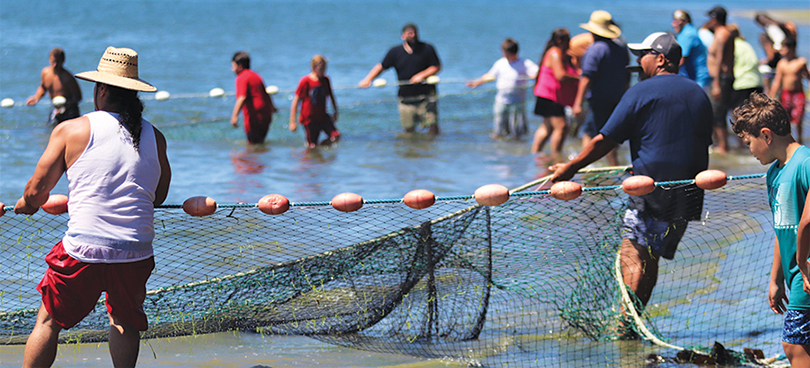
By Micheal Rios, Tulalip News
Event facilitators and support staff took to the calming, compact sand of Spee-Bi-Dah beach shortly after sunrise on Saturday, July 20. As they prepped the shoreline for hundreds of soon-to-be arriving guests, lifetime fishermen and current Tribal Councilman Glen Gobin captained his boat and crew as they made one large, sweeping arc after another along the coastline.
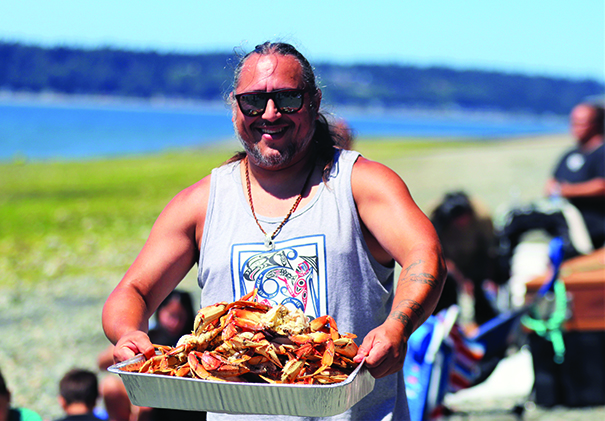
With each pass, their trailing net formed a visible horseshoe shape atop the water, which built anticipation and excitement among observers who wondered what kind of seafood bounty would soon reveal itself. Tulalip culture bearers of all ages and fishing experience were joined by local community members in a unified effort to pull in the jumbo-sized net from the ocean bank. When the net was nearly to the shore, Chinook salmon would alert their presence by splashing the shallow waters with their tails. Time and time again, the simple sound of fish tails breaking the Salish Sea would immediately lead to children screaming in absolute delight.
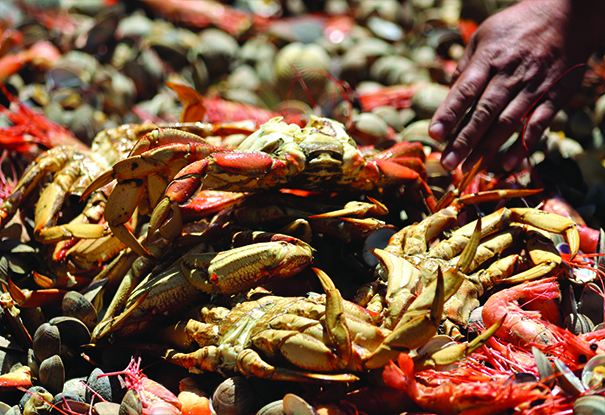
Only a matter of minutes later, the beach seined Chinook were expertly processed, carved into filets, smoked on the spot, and made readily available for exquisite consumption. These were the stunning scenes that laid the foundation for the always culture-fueled, community building seafood extravaganza that is Spee-Bi-Dah.
Captain Glen once described the annual beach seining event as “a lifetime of memories. This is how we used to fish all the time. Every year, I’m amazed at how many people come out to partake and enjoy the day. Spee-Bi-Dah really is a great community event. Like it was for our past generations, today is a shared community experience.”
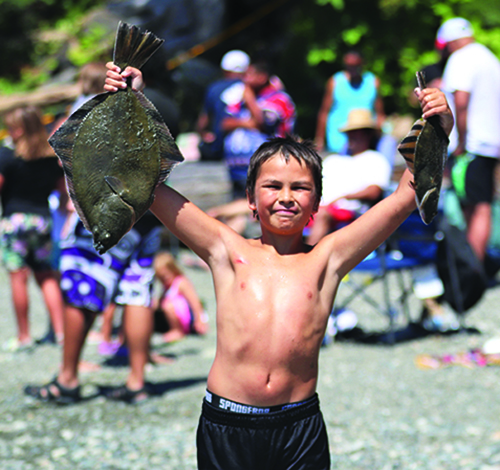
As the temperature soared into the upper 80s on the gorgeous summer day, so too did the sense of community and shared purpose alongside the especially meaningful stretch of Salish Sea shoreline.
“One of my favorite things is seeing all the babies play on the beach and in the water. Seeing their spirits so high on in these ancestral fishing grounds reminds me that our ancestors are here, too, and we are making them so proud by keeping the culture alive,” said Tulalip elder Lena Hammons shortly after witnessing her great-granddaughter Sevi enjoy some crab.
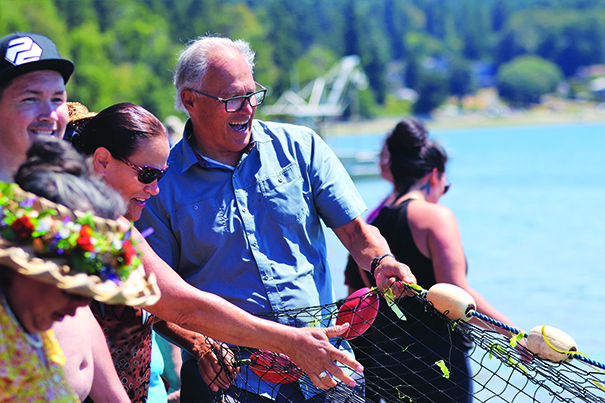
“The children pulling the net in and picking fish straight from the sea is a sight I’ll never tire of seeing. To me, that’s healing the community and healing the trauma inflicted upon our ancestors who weren’t allowed to be proud Tulalip people, especially those generations of children who were stripped of their culture during the Boarding School Era,” she continued. “Spee-Bi-Dah brings us all together for a good event that’s spiritually empowering. It’s just awesome to experience and grows bigger every year as our tribal membership continues to grow bigger.”
Indeed, with Tulalip membership now over 5,300 and showing no signs of slowing down, there are always blossoming families to be found immersing themselves in a tidal wave of Coast Salish culture at events like Spee-Bi-Dah. One such family seen sprawled out on the Spee-Bi-Dah sands, filling their bellies with a seafood feast were momma bear Stephanie Ancheta and her three boys Zaylen (11), Xavier (5), and Calvin Jr. (2).
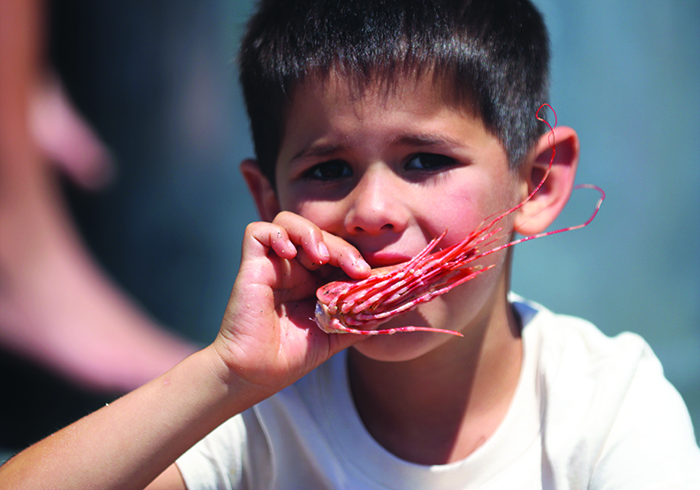
Asked what’s their favorite seafood, Zaylen said crab before cracking open a crap leg, and Xavier said salmon while staring into the beady eyes of a shrimp that dwarfed his hand.
“I’ve so been looking forward to this day because I was unable to attend the last two years,” admitted Stephanie. “We’re having a lot of fun. It’s really cool to spend the day out here, eating good foods and running into people we know. It really is a special occasion to have all these delicious foods available to us. Salmon is something we have regular access to, but the crab, clams, and shrimp we don’t. For me, watching my boys try new foods and really take a liking to them is pretty cool.”
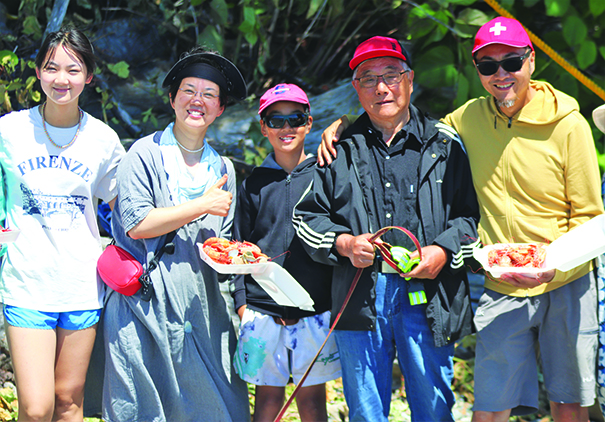
Among the many attendees were residents of the gated Spee-Bi-Dah housing community, which included a family of Chinese immigrants headed by patriarch Zhou Bailang. They shared how after immigrating to the U.S., they eventually settled in the Pacific Northwest because of the natural beauty, fantastic climate, and connection to the sea, specifically fish and fishing.
“My son and I share a passion for fishing. He gets so excited for this day because he gets to help pull the net in,” said Zhou while sitting in a shaded area with his family. “This is our biggest family gathering of the year. This year we flew in our parents from China so they could be here with us. It’s their very first time here.”
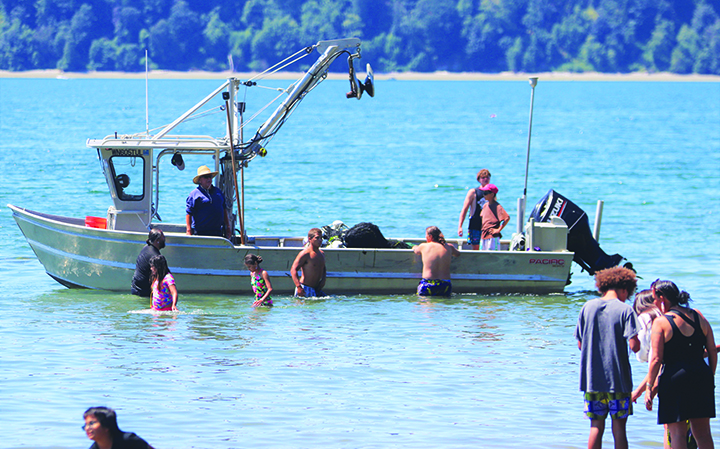
Epitomizing what it truly means to participate in a cultural exchange, Zhou and his son could be seen regularly helping to pull the net in. Zhou’s son even received some first-hand wisdom from Captain Glen that he later used when showing several Tulalip youth how to pull the net in as a team, instead of as individuals.
Over the day-long celebration of culture and community, hundreds and hundreds enthusiastic beach goers enjoyed the many sights, sounds, and delicious tastes that make the annual beach seine such a highly anticipated and coveted event. The freshest seafood-filled meals were enjoyed, while friends and families reminisced about old times.
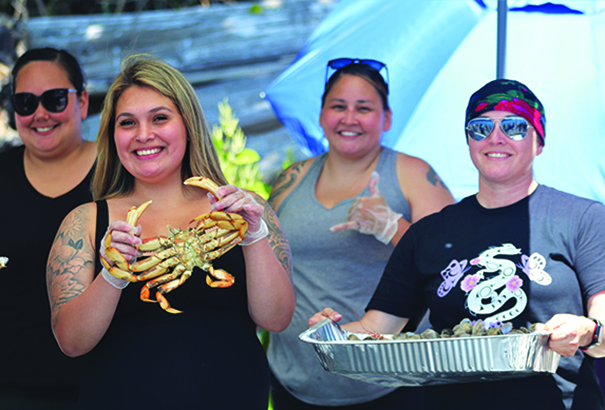
Stories shared and memories made weren’t just confined to the Spee-Bi-Dah shores either. Just like years past, Tulalip implemented a shuttle system for most efficient transport to and from the event. One of the drivers responsible for shuttling individuals and families from their parked vehicles at the Gathering Hall to the beach was John Ordonia-Davis.
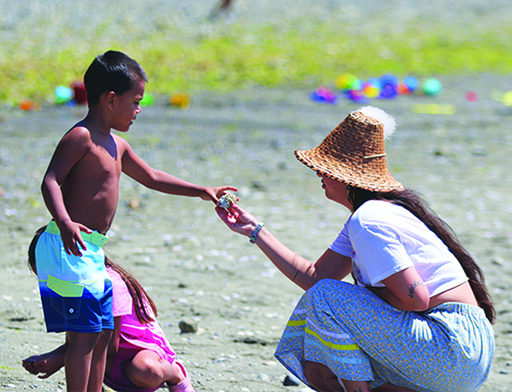
“I started shuttling support staff down to the beach at 6:00 a.m. and then all the individuals and families who started showing up around 9:00 a.m. We continue shuttling well into the evening, until the beach is clear.” explained John. “It’s always cool to hear people’s excitement while driving them down there and then to hear all about their experience when driving them back to the Gathering Hall. One particular story that stands out is this couple of first-time tribal members, older too, who told me how much they loved seeing so much family they haven’t seen in years. They were so happy the Tribe made this happen. Their big smiles and excitement in their voices is something I won’t forget.”
Surely, that story shared with John in the shuttle van is but one of a countless number that were retold that day by Spee-Bi-Dah attendees who were eager to share their experience with others. It’s those stories and the many shared photos that prove what was really caught in those beach seine nets wasn’t salmon, what was truly caught was culture and community.